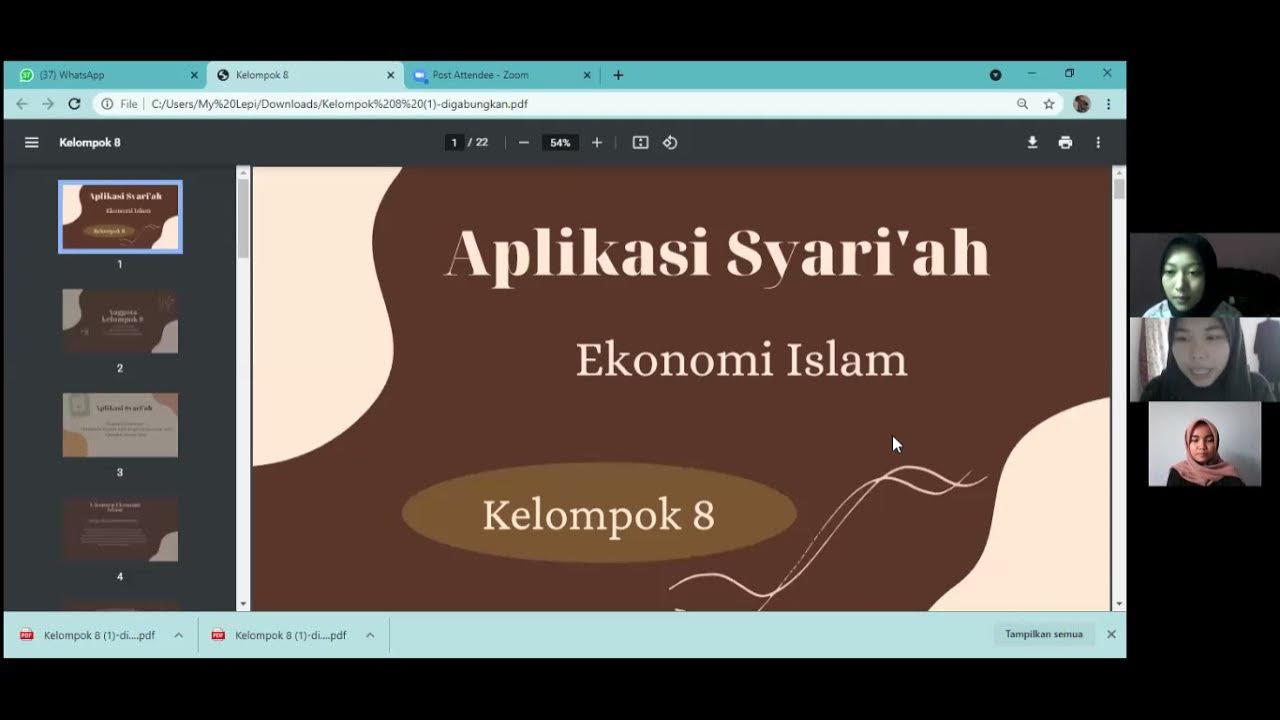TEORI PRODUKSI MENURUT EKONOMI ISLAM
Summary
TLDRThis video script explores the concept of production from both conventional and Islamic economic perspectives. It contrasts the conventional focus on profit maximization with the Islamic view, which incorporates ethical and moral considerations like societal welfare and environmental impact. The script explains the basic process of production, including input, process, and output, and introduces key Islamic principles such as Tawhid, justice, and Maslahah. While both systems recognize the importance of profit, the Islamic approach prioritizes holistic well-being, emphasizing that production should benefit both individuals and society while aligning with spiritual values.
Takeaways
- 😀 Production theory involves transforming inputs (materials, labor, capital) into outputs (products or services).
- 😀 Conventional production theory focuses on maximizing utility and profit by efficiently managing factors like labor, land, and capital.
- 😀 In conventional theory, production's ultimate goal is to maximize profit, with profit calculated by subtracting total cost from total revenue.
- 😀 Islamic production theory emphasizes not just profit but also societal welfare, ethical behavior, and environmental sustainability.
- 😀 The concept of 'maslahah' in Islamic production refers to actions that bring benefits not only to individuals but also to society and the environment.
- 😀 In Islamic economics, production is seen as a way to achieve moral and material well-being, fulfilling both worldly and spiritual goals (Falah).
- 😀 Islamic production principles include five key values: Tauhid (God’s will), Humanity (Insaniyah), Justice (Adl), Benevolence (Maslahah), and Responsibility (Hurriyah and Amanah).
- 😀 Tauhid emphasizes that all production activities must align with God's will and moral laws, avoiding harm or unethical practices.
- 😀 The principle of Humanity (Insaniyah) stresses the fair and just treatment of workers, including appropriate working conditions and respect for human dignity.
- 😀 Islamic production also prioritizes fairness and justice in the distribution of resources and profits, aiming for equitable outcomes for all involved.
Q & A
What is the definition of production in conventional economics?
-In conventional economics, production is defined as the process of transforming input factors into output products, such as turning raw materials into finished goods. The goal is to increase the utility of these goods to fulfill consumer needs.
How does the modern theory of production differ from the traditional one?
-The modern theory of production expands beyond just creating products. It includes activities such as storage, distribution, transportation, and retailing, whereas the traditional theory focuses only on the transformation of raw materials into goods.
What is the definition of production in Islamic economics?
-In Islamic economics, production is not only about creating goods but also incorporates moral and ethical considerations, aiming for the welfare of individuals and society. It is guided by religious principles, aiming for Falah, or success in both this life and the hereafter.
What are the key factors of production in economics?
-The key factors of production include land (natural resources), labor (human resources), capital (financial and physical assets), and entrepreneurship (the ability to organize and manage the other factors).
What is the ultimate goal of production in Islamic economics?
-The ultimate goal of production in Islamic economics is not just profit maximization but achieving Falah (success in both worldly and spiritual life). This includes fulfilling material needs while ensuring moral, ethical, and social responsibilities.
How does Islamic production theory differ from conventional production theory?
-Islamic production theory differs from conventional theory by focusing on moral and ethical principles. While profit is acknowledged, production in Islam also seeks to ensure public welfare (Maslahah), environmental sustainability, and social justice, rather than simply maximizing profits.
What is Maslahah in Islamic economics?
-Maslahah refers to the public good or benefit. In Islamic economics, production should not only benefit the producer and consumer but also contribute positively to society and the environment. It involves producing in ways that are beneficial for the broader community.
What are the principles of production in Islam?
-The principles of production in Islam include: 1) **Tawhid (Monotheism)** - aligning with the will of Allah; 2) **Insaniyah (Human Dignity)** - ensuring fair labor practices; 3) **Adl (Justice)** - promoting fairness in production and distribution; 4) **Maslahah (Public Good)** - contributing to the common good and avoiding harm; 5) **Hurriyyah (Freedom) and Mas'uliyyah (Responsibility)** - ensuring freedom of production while being responsible for the moral and social impacts.
What is the role of justice in Islamic production?
-Justice in Islamic production emphasizes fairness in both the production process and in how the resulting goods or services are distributed. It aims to ensure that all parties involved in production are treated fairly and that the benefits of production are equitably shared.
What is the significance of **Tawhid** in Islamic production?
-Tawhid, or the belief in the oneness of Allah, is foundational to Islamic production. It dictates that all production activities should align with Allah's will and avoid any practices that contradict Islamic teachings, such as producing harmful or unlawful products.
Outlines

このセクションは有料ユーザー限定です。 アクセスするには、アップグレードをお願いします。
今すぐアップグレードMindmap

このセクションは有料ユーザー限定です。 アクセスするには、アップグレードをお願いします。
今すぐアップグレードKeywords

このセクションは有料ユーザー限定です。 アクセスするには、アップグレードをお願いします。
今すぐアップグレードHighlights

このセクションは有料ユーザー限定です。 アクセスするには、アップグレードをお願いします。
今すぐアップグレードTranscripts

このセクションは有料ユーザー限定です。 アクセスするには、アップグレードをお願いします。
今すぐアップグレード関連動画をさらに表示

TEORI PRODUKSI DAN KONSUMSI DALAM ISLAM

KONSEP UANG DALAM PERSPEKTIF ISLAM || TUGAS UTS || MANAJEMEN KEUANGAN SYARIAH 3F || IAIN TULUNGAGUNG

Ontologi Ekonomi Islam

Aplikasi Syari’ah (Ekonomi Islam)

Concept of Equality and Its Major Debates | Main Thinkers | Political Theory | UPSC PSIR | UGC NET

3.1 Konsep Dasar Ilmu Ekonomi (2)
5.0 / 5 (0 votes)
